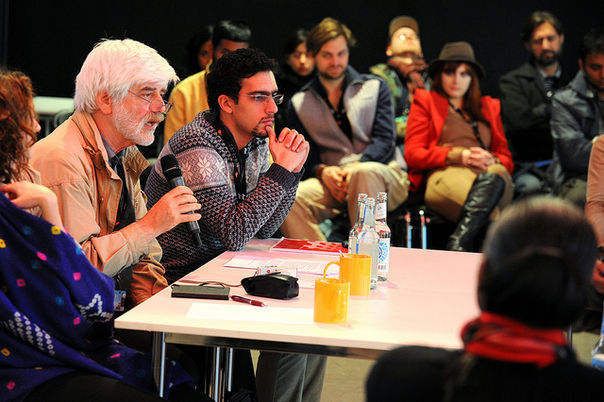Screenplays, Stories, Meanings
The "Dial F for Fiction" event discusses the scripts the participants of the Berlinale Talent Campus Script Station have worked on.

The Berlinale Talent Campus Script Station.
The Berlinale Talent Campus Script Station brings together young screenwriters working on developing projects for an intensive week of discussions and workshopping. Participants in the programme meet with each other and with their mentors, film professionals who work one-on-one with writers during the programme. Merle Kröger, project coordinator of the Script Station, says that one of the programme’s central aims is that participants should not see it as a place for pitching or trying to sell their projects, but as a space for working out problems integral to the stories, separately from any financial concerns. Some of the projects have already received some funding to go into production, while others have not, but, Kröger insists, “all that is totally separate from what we do. Our only aim is that the film be made some day.”
“What we offer,” says Kröger, “is one space in which discussion can happen between participants,” as well as between participants and their mentors. At today’s “Dial F For Fiction” presentation, the twelve screenwriters and six mentors gave short presentations on the screenplays being developed and on the work they have done this week. The presentation allowed a glimpse into the twelve projects and the collaborative atmosphere of the Script Station. The international character of the programme was also made abundantly clear, with writers from eleven countries presenting projects that range from localised explorations of specific communities to bigger stories set across multiple countries.
At the same time, similarities can be found between the different projects and the way the writers have chosen to present them. All of them, both in the one-page treatments provided by the participants and in the presentations they and their mentors gave today, emphasise the social concerns they wish to explore and the messages they believe their stories provide. One writer states that they want their film to teach audiences that “only comprehension can lead to tolerance”; another writes that the forest in which their story is set “is a metaphor for [the protagonist’s] primitive desires”; a third informs us that “this story reveals the compromised position of all parties [and that] nobody is blameless, nobody wholly evil.”
While it is admirable that young screenwriters such as these are concerned with how their projects relate to social and political questions, it is hard not to find such announcements detailing the precise meanings of these as-yet unmade films rather limiting. The writer Roland Barthes once remarked: “The best films (for me) are those that suspend meaning the most.” It is the nature of film production today that projects must be as precisely planned as possible, with their meanings laid out in the screenplay as definitively as their lines of dialogue; one has to wonder what space there is for the creative engagement of the spectator viewing a film whose meanings are so tightly controlled and announced before it has even gone into production.


301 Moved Permanently